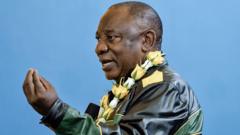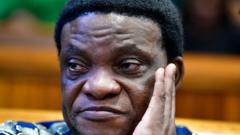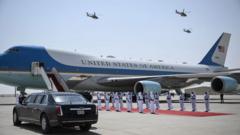As President Cyril Ramaphosa heads to Washington for his first meeting with Donald Trump, his expertise as Nelson Mandela's chief negotiator may be key to mending the fractured South African-U.S. ties. With ongoing tensions over land policies and controversial claims from Trump regarding South Africa, the stakes are high for Ramaphosa.
Ramaphosa's Diplomatic Gamble: Bridging the Divide with Trump

Ramaphosa's Diplomatic Gamble: Bridging the Divide with Trump
South African President Cyril Ramaphosa prepares for a pivotal meeting with U.S. President Donald Trump, aiming to restore strained relations through effective negotiation and trade.
South African President Cyril Ramaphosa is gearing up for a significant meeting with U.S. President Donald Trump at the White House, marking a crucial moment in efforts to repair the strained relations between the two nations. A notable figure in South Africa's history, Ramaphosa previously served as the chief negotiator for Nelson Mandela’s African National Congress (ANC) during the pivotal talks that ended apartheid in the early 1990s. His renowned negotiation skills will be tested as he tries to win over Trump's administration.
In a statement earlier this week, Ramaphosa emphasized the importance of trade relations, stating, "We want to come out of the United States with a really good trade deal," signaling South Africa's intention to strengthen ties with the U.S. However, tensions have escalated significantly since Trump took office, particularly following Ramaphosa's enactment of a controversial bill that permits the South African government to expropriate land without compensation under certain conditions. This legislation has drawn ire from the Trump administration, further complicating diplomatic interactions.
Adding to the complexities, Trump administration officials have been somewhat reticent about Ramaphosa's visit. The President's previous incendiary claims regarding supposed "genocide" of white Afrikaners in South Africa, a narrative fueled by close adviser Elon Musk, have only strained relations further. The controversial nature of these claims has led to a recent suspension of aid to South Africa from the U.S. and prompted the expulsion of South Africa’s ambassador to Washington, Ebrahim Rasool.
According to political analysts, Ramaphosa's visit could lead to either a positive diplomatic reset or exacerbate existing tensions, depending on how the discussions unfold. Professor Anthoni van Nieuwkerk warns that if the focus remains on contentious issues—like white genocide—there could be significant fallout. Conversely, he notes that a more cordial dialogue could pave the way for a much-needed trade agreement that benefits both nations.
The South African delegation’s limited preparation time for the Washington meeting has raised concerns. Ramaphosa's spokesperson indicated hopes for a dialogue that could potentially address the future of the African Growth and Opportunity Act (AGOA), which provides vital trade benefits to South Africa and is up for review soon. The current geopolitical climate underscores the significance of this meeting, with both nations needing resources from each other.
While the session is clearly high-stakes, Ramaphosa’s invitation extended to Trump for a round of golf during the upcoming G20 Summit may also serve to bridge gaps. With well-known golfers Ernie Els and Retief Goosen aboard his delegation, Ramaphosa aims to blend diplomacy with personal rapport, suggesting that common interests could steer discussions in a productive direction.
Political analysts, including Dr. Lubna Nadvi, contend that this meeting is pivotal for reshaping the narrative surrounding South Africa. They stress the need for the U.S. to recognize South Africa's sovereignty in deciding its domestic policies, especially in light of external pressures.
With mixed feelings surrounding the outcomes of such negotiations, Ramaphosa's strategy appears to embody both hope and caution. While South Africa seeks to utilize its trade relationship with the U.S. to advance its economic interests, there are those who suggest that the repercussions of failure could lead to unintended consequences, especially in a geopolitical landscape that could see other nations eager to exploit any weaknesses.
Ultimately, Ramaphosa's meeting with Trump represents not just a singular diplomatic encounter but potentially a watershed moment for both nations, as they work to navigate contentious issues while striving for mutual understanding and cooperation moving forward.




















